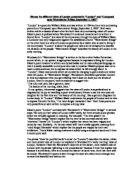Peacham describes the diverse nature of London from the nobility to the poor. Suggesting that people come to London to escape poverty, to seek employment or for the reasons of profit. It is true that life in Stuart England was lit up by striking contrasts. The greatest contrast of all was between the heights of individual wealth – with the nobility, merchants and professional men enjoying carefully acquired capital while in the depths of poverty many depended on the poor rate or on charity.
Peacham advises visitors to the city to ‘arm themselves with patience and to be cautious of people waiting to take things from you.’ He also warns that one should choose his acquaintances with caution because according to the company you keep, ‘every man finds his own valuation high or low.’ Emphasising that one must come to London with a purpose, with your eyes fixed on your goal. And stating that the ‘city is the quicksand; the longer you stand upon it the deeper you sink.
Peacham addresses visitors to the city to avoid idleness, and tells of activities that according to him make a person idle. Don’t waste your money in taverns as other nations might. He warns that one should take care not to drink too much. Stating ‘drinking begets challenges and quarrels and occasioneth the death of many, as known by almost daily experience.’ He describes how even young heirs and gallant men end up incarcerated in prisons such as Newgate. Peacham believes that one should not waste their time going to taverns or seeing plays but instead one should diligently follow the business that brought you to London in the first instance.
Money appears to be one of the principal concerns for Londoners, Peacham describes the things one can spend money on while in London, - clothes in fashion, plays, tavern feasts horse and coach hire to name but a few. Instruction for avoiding the pitfalls of spending money on inappropriate, self-indulgences is given, ‘For an antidote to these several poisons let me prescribe to my city country gentleman these receipts or remedies. Let the bible and other books such as philosophy, natural or moral history, mathematics and music be our chief company as they will be true to you.” Leading us to believe that these pursuits will not corrupt you or take your money or flatter you in order to get something.
Peacham states that one should take care to save money cautioning against gambling (especially where ordinary people reside), as London is rife with cheating. It is to this that he blames the fair estates of rich families, being near or far from the city, being bought and sold. Also how very few homes are held out in the name to the third generation.
When out and about, gentlemen should be distrustful of people that he may come into contact with for Londoners employ many tricks to entice money from a gentleman. He stresses to visiting men who have money to be careful of certain woman who will try to beguile them with the intention of taking from them whatever they can. Peacham warns men with money to keep a close eye on servants that they have brought from the country to London. He says ‘have a great eye over them he will quickly be corrupted in the city with much acquaintance.’ A word of advice is given to visitors or even inhabitants of London; stay out of debt – ultimately it will land you in prison. Here he states ‘let him owe as little as he can to his tailor for following the fashion, than which there can be no greater misery.’
Peacham declares that a mans most important job on entering London should be to set up his horse and see it well fed, and suggests that you should check your belongings yourself and not to rely on another to do it for you. ‘Think it therefore no disgrace in a city inn to see to your horse everyday yourself, and to see him well meated, rubbed and watered.’
In London there is work for most people if they are willing to work hard and not succumb to the evil of the City they may in fact even become aldermen or aldermen’s wives. In fact London is a good place for the poor, ‘whom hath the city more advanced than poor men’s children.’
Although Peacham condemns London as a corrupt city he admires those who have the ability to live and endure in it. If one is intelligent, hard working and strong, one may in fact not only be able to survive in London but also will be able to master its mysteries and become a respected member of society. In conclusion to survive in London he gives one rule never to be forgotten ‘To serve god, avoid idleness, to keep your money, and to beware of ill company.’







